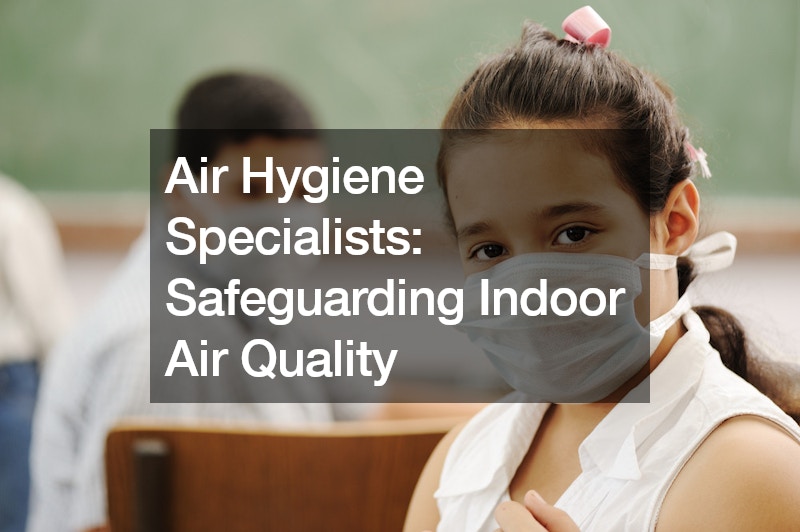While we often think of fresh outdoor air as the key to respiratory health, the reality is that we spend a significant amount of time indoors. The Environmental Protection Agency (EPA) estimates that Americans spend as much as 90% of their time indoors [1]. Unfortunately, the air within our homes, workplaces, and other buildings can become polluted with various contaminants, leading to a decline in indoor air quality (IAQ). This is where air hygiene specialists step in – these dedicated professionals play a vital role in safeguarding the air we breathe and protecting our health from the potential hazards of indoor air pollution.
The Invisible Threat: Indoor Air Pollution and its Health Impacts
Indoor air pollution can encompass a variety of contaminants, including:
Volatile organic compounds (VOCs): Emitted from building materials, furniture, cleaning products, and personal care items, VOCs can irritate the eyes, nose, and throat and may contribute to headaches and nausea. Biological contaminants: Mold, mildew, and dust mites can trigger allergies and asthma symptoms.
Carbon monoxide (CO): This colorless and odorless gas can be produced by malfunctioning appliances, leading to dizziness, headaches, and even death in high concentrations. Radon: A naturally occurring radioactive gas, radon exposure is linked to an increased risk of lung cancer. Exposure to these pollutants can have a significant impact on our health, causing a range of symptoms such as:
Respiratory problems: Dry cough, wheezing, and difficulty breathing are common signs of respiratory irritation caused by indoor air pollution. Headaches and fatigue: Poor indoor air quality can lead to headaches, fatigue, and difficulty concentrating. Allergic reactions: For those with allergies or asthma, exposure to indoor allergens can trigger symptoms like sneezing, itchy eyes, and runny nose. Long-term health risks: Chronic exposure to some indoor air pollutants has been linked to more serious health problems, including heart disease, cancer, and neurological impairments. Air Hygiene Specialists: Champions of Healthy Indoor Environments
Air hygiene specialists act as guardians of our indoor air, protecting us from the invisible threats of air pollution. Their expertise lies in:
Assessment and Monitoring: They conduct thorough indoor air quality assessments. This involves identifying potential sources of pollutants and utilizing specialized equipment to measure pollutant levels. Air sampling allows them to determine the types and concentrations of contaminants present. Data Analysis and Solutions: Once air samples are collected, air hygiene specialists analyze the data to pinpoint the source of the problem. This analysis forms the basis for recommending effective solutions, such as improved ventilation systems, removal of pollutant sources, or implementing air purification systems. Collaboration and Planning: Air hygiene specialists rarely work alone. They collaborate closely with engineers, architects, and other building design and maintenance professionals. This collaborative approach ensures that solutions are effective and consider factors like cost-efficiency and practicality within the existing building structure. Beyond the Science: The Skills of a Successful Air Hygiene Specialist
While a strong foundation in science is essential, air hygiene specialists also possess a unique blend of interpersonal skills:
Analytical and Problem-Solving Skills: Air hygiene specialists must interpret complex data from air sampling and monitoring equipment. They must be adept at problem-solving to identify the root cause of poor air quality and develop effective solutions. Communication and Interpersonal Skills: Clear communication is paramount. Air hygiene specialists must communicate complex technical details effectively to stakeholders with varying levels of scientific background. Strong interpersonal skills are crucial for collaboration with a diverse team of professionals. Knowledge of Regulations and Standards: Staying current with ever-evolving environmental regulations and indoor air quality standards is essential. Air hygiene specialists ensure their solutions comply with all relevant regulations, protecting building occupants and adhering to legal requirements. Investing in Your Health: The Value of Utilizing Air Hygiene Specialists
While the core responsibilities and skills of air hygiene specialists have been established, there are several compelling reasons to utilize their expertise:
Improved Health and Productivity: Air hygiene specialists can create healthier indoor environments by addressing air quality issues. This can lead to improved occupant health, reduced absenteeism, and increased productivity. Reduced Liability: Building owners and managers have a legal responsibility to ensure the health and safety of occupants. Air hygiene specialists can help them meet this obligation by identifying and mitigating potential air quality hazards, potentially reducing the risk of lawsuits or liability issues related to poor indoor air quality. Peace of Mind: Many factors can contribute to poor indoor air quality, and pinpointing the source can be challenging for those without specialized training. Air hygiene specialists offer a comprehensive approach to identifying and addressing air quality concerns, providing building owners and occupants with peace of mind. Sustainability and Energy Efficiency: Some solutions for improving indoor air quality, such as optimizing ventilation systems, can also contribute to building sustainability and energy efficiency. Air hygiene specialists can help find solutions that address air quality concerns and align with broader sustainability goals. Who Can Benefit from Air Hygiene Services?
While everyone can benefit from good indoor air quality, some groups may be particularly susceptible to the negative health effects of indoor air pollution:
Children: Their developing respiratory systems are more vulnerable to the effects of pollutants. People with allergies or asthma: Exposure to indoor allergens can trigger symptoms and exacerbate these conditions. Older adults: Their respiratory systems may be more sensitive to pollutants. People with chronic health conditions: Indoor air pollution can worsen health problems. Considering Air Hygiene Services?
If you’re concerned about the air quality in your home, workplace, or another building, here are some factors to consider when deciding whether to utilize air hygiene specialists:
Visible Signs of Poor Air Quality: Are there noticeable mold or mildew growth signs? Do occupants frequently experience headaches, respiratory irritation, or fatigue? These could be indicators of poor air quality. Building Age and Construction: Older buildings or those with specific construction materials may be more prone to air quality issues. Renovations or Remodeling: Renovation projects can stir up dust and contaminants, potentially impacting indoor air quality. Air hygiene specialists can help assess air quality before, during, and after renovations. Specific Health Concerns: If occupants have pre-existing respiratory conditions or allergies, maintaining indoor air quality is even more crucial. Conclusion: Air Hygiene Specialists”; Building a Healthier Future
Air hygiene specialists play a critical role in safeguarding the air we breathe indoors. Their expertise helps create healthier environments for everyone, improving health, productivity, and overall well-being. By investing in air hygiene services, we can create a future where healthy indoor air is not a privilege but a right, protecting our health and ensuring a brighter future for generations to come.
.




